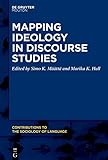Mapping Ideology in Discourse Studies / ed. by Simo K. Määttä, Marika K. Hall.
Material type: TextSeries: Contributions to the Sociology of Language [CSL] ; 118Publisher: Berlin ; Boston : De Gruyter Mouton, [2022]Copyright date: ©2022Description: 1 online resource (VI, 289 p.)Content type:
TextSeries: Contributions to the Sociology of Language [CSL] ; 118Publisher: Berlin ; Boston : De Gruyter Mouton, [2022]Copyright date: ©2022Description: 1 online resource (VI, 289 p.)Content type: - 9781501519956
- 9781501513732
- 9781501513602
- 401.41 23
- P302.84 .M37 2022
- online - DeGruyter
- Issued also in print.
| Item type | Current library | Call number | URL | Status | Notes | Barcode | |
|---|---|---|---|---|---|---|---|
 eBook
eBook
|
Biblioteca "Angelicum" Pont. Univ. S.Tommaso d'Aquino Nuvola online | online - DeGruyter (Browse shelf(Opens below)) | Online access | Not for loan (Accesso limitato) | Accesso per gli utenti autorizzati / Access for authorized users | (dgr)9781501513602 |
Frontmatter -- Contents -- Chapter 1 Introduction -- Chapter 2 Discourse and ideology in French thought until Foucault and Pêcheux -- Chapter 3 Teaching French in Acadia: From a discourse of linguistic diversity to a standard ideology -- Chapter 4 Ideology and emancipation through the prism of performativity: Immolation and mottos of struggle as moments of popular counter-discourse -- Chapter 5 Language trouble.s -- Chapter 6 The ideological grounding of the new normal: Anti-discourse meets utopia -- Chapter 7 Hiding in plain sight: Methodological ideologies in discourse research in applied linguistics -- Chapter 8 Ideology in cognition and discourse -- Chapter 9 Licensing through English -- Chapter 10 Language ideologies and the translation of scholarly texts -- Chapter 11 Negotiating ideologies and the moral order in child protection social work -- Chapter 12 Challenging ideologies and fostering intercultural competence: The discourses of healthcare staff about linguistic and cultural barriers, interpreters, and mediators -- Chapter 13 Taking a corpus-based approach to investigating discourse and ideology in the language sciences -- Chapter 14 Afterword -- Index
restricted access online access with authorization star
http://purl.org/coar/access_right/c_16ec
Discourse and ideology are quintessential, albeit contested concepts in many functionally oriented branches of linguistics, such as linguistic anthropology, critical discourse studies, sociolinguistics, and sociology of language. With many ways of understanding and utilizing the concepts, the line between discourse and ideology can become blurry. This volume explores divergent ways in which the concept of ideology may be applied in different branches of sociolinguistics and the sociology of language, critical discourse studies, and applied linguistics. The goal is to provide an overview of the ways in which these two concepts can be used separately or together, emphasizing one or the other depending on the ways in which the concepts and their relationship are defined. The volume is targeted at scholars working in various fields of linguistics in which discourse and ideology are used as theoretical and analytical tools. While the target audience includes both senior and junior scholars, a particular goal is to reach junior scholars, who often struggle with the distinction between discourse and ideology and their theoretical and methodological potential. The volume is suitable for classroom use at the graduate level.
Issued also in print.
Mode of access: Internet via World Wide Web.
In English.
Description based on online resource; title from PDF title page (publisher's Web site, viewed 25. Jun 2024)


